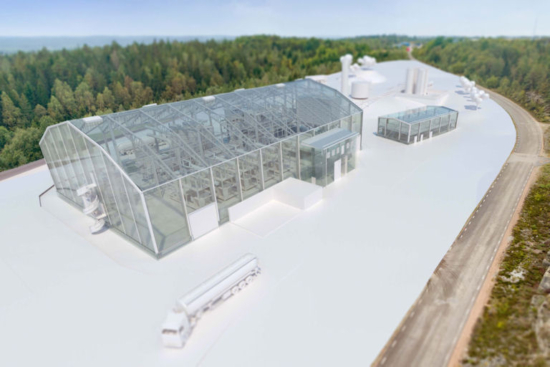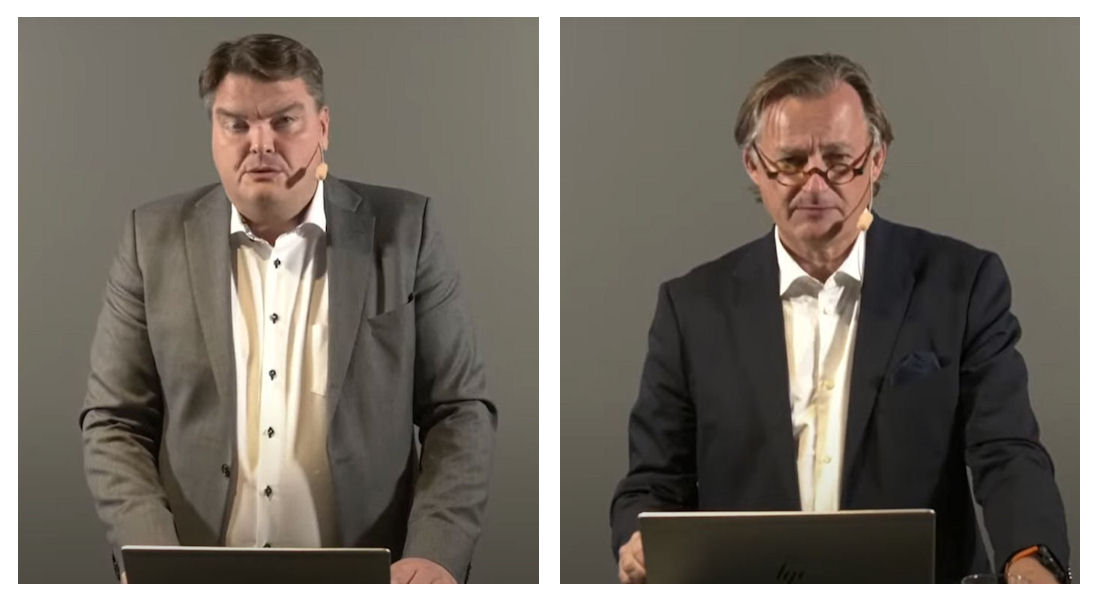UK facility to feature early in Scandinavian Enviro Systems’ global rollout
 Enviro’s plant in Uddevalla, Sweden, will serve as a template for further international expansion (Photo: Scandinavian Enviro Systems)
Enviro’s plant in Uddevalla, Sweden, will serve as a template for further international expansion (Photo: Scandinavian Enviro Systems)
A business that claims a nearly endless market to conquer with projected EBITDA margins approaching 70 per cent is either deluded or on to a good thing. And as the deluded don’t receive substantial investment from firms such as Michelin, the latter must apply in the case of Scandinavian Enviro Systems (Enviro). The company aims to be the leading player in the circular economy for tyres and wants to secure a 15 to 30 per cent share of the global market for recovered carbon black. The UK is tipped to be an early beneficiary of these ambitious growth plans.
Michelin’s investment in Enviro earlier this year, which currently gives the tyre maker a 20 per cent stake in the Swedish firm and propels it into the role of largest shareholder, serves as confirmation that Enviro may be in the right place at the right time. Tyre makers around the world are striving to improve their sustainability credentials; substituting carbon black and petroleum-derived oil for sustainable materials are highly effective means of achieving this, as evidenced by Enviro’s claim that its recovered carbon black has a CO2 footprint 93 per cent lower than that of virgin carbon black. The company sees enormous opportunities in the presently limited to non-existent availability of such materials.
Speaking at a recent Capital Markets Presentation, Enviro’s chief executive officer, Thomas Sörensson, confirms that Enviro is “now ready” for its “next phase of growth.” This sense of readiness can in part be traced back to the tie-up with Michelin, but significantly it also follows the accreditation in September of Enviro’s recovered oil and carbon black under the International Sustainability & Carbon Certification (ISCC) scheme. Enviro is the first company in the world to receive ISCC certification for recovered carbon black, and Sörensson views this as a “milestone in the company’s development.”
$26 billion market gap
“We know that all tyre manufacturers are desperate to fully replace petroleum-based materials in their tyres,” stresses Alf Blomqvist, chairman of the Enviro board. “Enviro is the first and, so far, the only company in the world with a sustainability certificate for carbon black. This creates an enormous opportunity for Enviro, with a market gap of US$26 billion.”
Blomqvist draws this figure from the current market for virgin carbon black, which is worth approximately $24 billion and expected to grow at 8.8 per cent CAGR through 2023, but he concedes that there aren’t enough end-of-life tyres in the world to fill this gap; assuming a best-case scenario in which Enviro had every last end-of-life tyre at its disposal and a market hungry for recovered carbon black, it could only produce enough to meet half the global demand. Supplying this 50 per cent maximum would require the setting up of between 900 and 1,000 Enviro plants, each with a capacity to process 30,000 tonnes of end-of-life tyres a year.
Blomqvist’s glass is half full and he sees the aforementioned 50 per cent ceiling as an opportunity rather than a problem, believing this will help Enviro establish tyre-derived, sustainable carbon black as a premium product. “And have premium pricing, he adds.
Another trend is rising global tyre volumes and, consequently, the growing number of end-of-life tyres generated every year. More than a billion pieces now reach the end of the road annually and this figure is expected to grow four to five per cent. The chairman of the board’s calculations indicate that 25 new 30,000 tonne plants would need to be built every year in order to keep pace with this. “Our conclusion is, therefore, that this is nearly an endless market for Enviro to capture.”
During an online Capital Markets Presentation hosted by Thomas Sörensson (l) & Alf Blomqvist, Enviro provided an update on Enviro’s plans in Sweden and beyond (Photos: YouTube screenshots)
First full-scale plant
Of course, Enviro doesn’t expect or even desire the market all to itself. Blomqvist comments that “we will all benefit from several actors here being successful” and that “the leading consumers of recovered carbon black would most likely support a multi-sourcing strategy” and Thomas Sörensson shares that Enviro aims for a more realistic capacity build-up of around 120,000 tonnes of end-of-life tyres annually via its modular production process. This figure represents Enviro’s construction of around four new plants a year. He expects the company will reach a capacity of more than 900,000 tonnes of end-of-life tyres per year in 2030, excluding plant projects jointly undertaken with Michelin such as the facility now being set up in Chile. This would give Enviro some 30 facilities around the world by this date. The chief executive officer anticipates annual sales in excess of SEK 7 billion (£594.8 million) by this time as well as EBITDA beyond SEK 4.5 billion (£382.3 million).
This path to 900,000+ tonnes begins with a SEK 400 million (£33.7 million) plant in Uddevalla, Sweden, Enviro’s first full-scale plant and a template for further international expansion. The company expects to complete the facility in the final quarter of 2030 and will bring it into operation with an initial capacity to process 30,000 tonnes of end-of-life tyres annually. Plans already call for a doubling of this capacity at a later date. Enviro is submitting its environmental permits for the site tomorrow and expects the approval process to take approximately 12 months.
Talks have already begun with partners for providing feedstock to the Uddevalla plant, up to 60,000 tonnes of end-of-life tyres per year. At the same time, discussions with potential customers regarding product supply are already taking place. Customers aren’t just interested in products coming from Uddevalla, either: Sörensson says dialogue also involves upcoming facilities, including at least one in our neck of the woods.
Circularity in the UK
“We have begun recruiting staff and partners who will be responsible for identifying sites suitable for establishing plants,” he elaborates. “This team will also work with environmental permit processing and site development. Here we will prioritise Western Sweden (Uddevalla is some 50 miles north of Gothenburg), thereafter the UK and Central Europe initially.”
Enviro launched a joint feasibility study in November 2020 to determine the viability of introducing its technology into the UK on a large scale. The company reported in June that it sees “favourable opportunities to establish a commercially successful recycling plant based on Enviro’s technology in the UK.” Although expecting low demand for recovered carbon black due to the paucity of local tyre manufacturing facilities, interest in recovered pyrolysis oil is already so great in the UK that it will be “possible to sell all the oil that can be produced.”
Thomas Sörensson confirms that the UK is “an interesting market” where Enviro will “further explore” the possibilities to establish capacity. “There are few tyre manufacturers in the UK, so the local demand for carbon black is small,” he says. “However, it is easy to export recovered carbon black and since the global demand is strong, we see no problem whatsoever in also selling the carbon black. In conclusion, this means that we also foresee favourable fundamental conditions for establishing plants based on our recycling technology in the UK.”
Beyond the UK and, of course, Sweden, the key area where Enviro is currently looking to set up a plant is Central Europe. “We are having discussions with a large number of tyre manufacturers regarding the demand, in time and place, for recovered carbon black,” shares the chief executive officer. “We’ve identified more than 90 tyre production facilities in Europe alone. Their main concentration is in Central Europe; the next step will be to develop a portfolio of sites, taking into account local regulations, taxation, distance to buyers of recovered carbon black and tyre pyrolysis oil, environmental permits and end-of-life tyre feedstock.”
100% or majority ownership
When setting up further plants, Enviro will utilise the model it’s following in Uddevalla. The company will rent the land and buildings it uses to minimise the amount of capital tied up in a project. Future plants will also be wholly or majority Enviro-owned unless a specific benefit can otherwise be gained, such as access to feedstock, an interesting location or a strategic industrial partner.
To illustrate the potential profitability of Enviro’s facilities, Alf Blomqvist discusses a theoretical 30,000 tonne plant in Europe. Building such a facility today would cost around SEK 400 million, the investment that Enviro is making in Uddevalla. He anticipates a market price for recovered carbon blacks similar to that of virgin carbon black, albeit with an initial discount of perhaps 15 per cent. Together with recovered oil, Blomqvist expects that the plant’s annual revenue when at full capacity would be SEK 240 million to 300 million (£20.2 million to £25.3 million).
“Since we do not have any significant cost for our biggest source material, end-of-life tyres, we expect a gross margin in the range of 70 to 75 per cent, giving us a gross profit of SEK 170 to 230 million (£14.3 million to £19.4 million) per year,” he continues. “This means we’ll have an EBITDA margin in the level of 61 to 69 per cent, which are extremely high levels. And that also means that, based on our EBITDA figures, we expect this to have a very short period for the payback for this kind of plant.” With an EBITDA margin of 61 per cent, Enviro estimates a payback period of 2.7 years.
Ability to execute plan will determine success
Like the tyre market, the global market for carbon black is highly consolidated, with the six largest players holding more than 50 per cent of the market. None of these firms have any carbon black recovery operations. “Established carbon black manufacturers have not kept up with the increased importance of circularity and therefore left a large, massive gap between what tyre manufacturers want and what they themselves can deliver,” says Blomqvist.
“The market for recycled carbon black is today almost non-existent, but has an enormous potential of almost 1,000 Enviro 30,000 tonne plants globally. Therefore, we do not see the market as a limitation; it is our ability to execute on our plan that will determine our success,” Blomqvist continues, adding: “We have an ambitious growth plan until 2030, with the ambition of reaching over 900,000 tonnes end-of-life tyre capacity by 2030, not including the facilities that Michelin chooses to build. Nevertheless, even with that plan, we only have scratched the surface of our potential.”




Comments